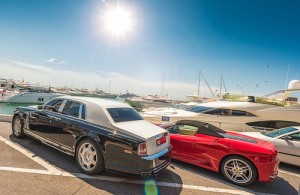
If money is no obstacle, Puerto Banús is the destination
With times tougher than ever for the average Spaniard, can some solace be sought in the knowledge that Marbella and the Costa del Sol continue to turn the heads of the global elite?
The glitzy resort has always operated on a different plane to the rest of Spain. Ever since the middle of last century when princes, playboys and film stars would frolic on the fledgling Golden Mile, Marbella has done things its own way…
If you have money in Marbella, anything goes. From the glamorous nightclubs of Puerto Banús to the Saudi Royal Family’s replica of the White House, wealthy foreign investors have been melding Marbella in their own image for years.
Largely, that image has been one of supreme ostentation and buying power driven by movers and sheikh-ers from Britain, America and the Middle East. The steady wealth of British, German and Scandinavian middle-class tourists and home buyers, meanwhile, gave everyday life in Marbella a distinctly northern European air.
But as the economic crisis tumbles on and on, things are changing. The winds are blowing from the east. Russian and Chinese holidaymakers are flocking in ever greater numbers to southern Spain. They come to enjoy the same things that traditional northern Europeans have – the fine weather, the superb infrastructure, the choice of luxurious properties, and – lest we not forget – the kudos of being seen in one of the world’s foremost luxury playgrounds.
In fact, Russian home buyers have now overtaken Germans as the second biggest group of foreign property buyers on the Costa del Sol. They now account for nine per cent of the property market, with Germans in third on seven per cent. Brits are far and away the biggest investors still, accounting for 35 per cent of all property, but the gap is closing.
The UN, meanwhile, estimates that 100 million Chinese tourists will travel to Europe annually by 2020. The Chinese, while attracted to the Costa del Sol, are expected to spread their cash farther and wider than the Russians, with many drawn to the UK for education and visas, Tuscany for the chance to own a rustic vineyard, and southern France for the Belle Vie lifestyle.
Chinese investors, wealthy as they may be, are more modest than Russian investors who bring with them supercars, megayachts and high demands on service wherever they go.
But the question for most Spaniards remains: is this new reality a good thing for Spain and its economy? The Brits flocked to Spain unimpeded in the ‘70s and ‘80s, and for ill or good, have stuck around and altered many parts of the Costa del Sol in their own image. Now it’s Russia’s and China’s turn.
This is just how it is. The nature of Capitalism is cyclical. The objects of the winners’ affections, however, don’t change that much. Whether British aristocracy or Russian oligarch, a terracotta-tinged Villa in the hills of Marbella leaves the elite salivating.
The average Spaniard, however, should take some solace in one enduring and inescapable fact: before his death in 2005, King Fahd of Saudi Arabia would spend up to two months in Marbella every year during the summer – visits that would pump up to €80 million into the local economy.
If the Russians and Chinese bring with them similar levels of spending power, then nobody should really have any problem with that…
 en
en



 Vlaams-Nederlands
Vlaams-Nederlands
0 Comments
Leave a Comment
DISCLAIMER
The opinions and comments expressed by contributors to this Blog are theirs alone and do not necessarily reflect the views of VIVA Homes Under the Sun Ltd, any of its associated companies, or employees; nor is VIVA to be held responsible or accountable for the accuracy of any of the information supplied.
Have you got something to say?